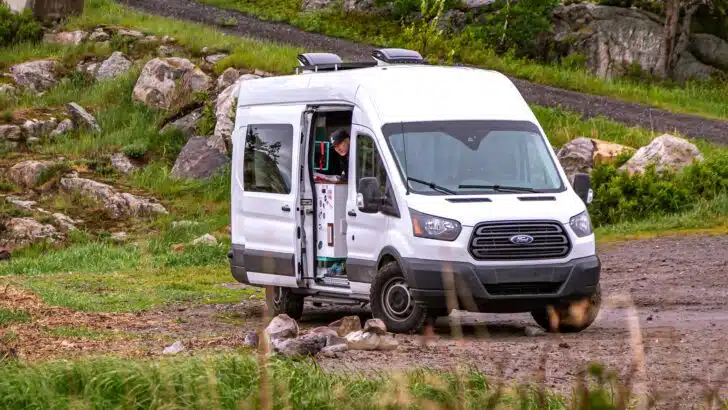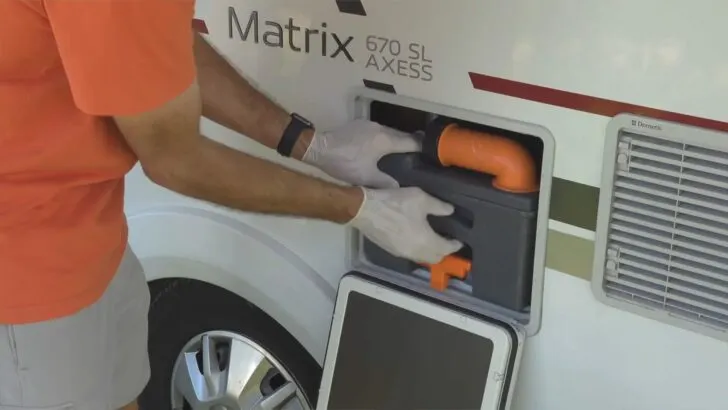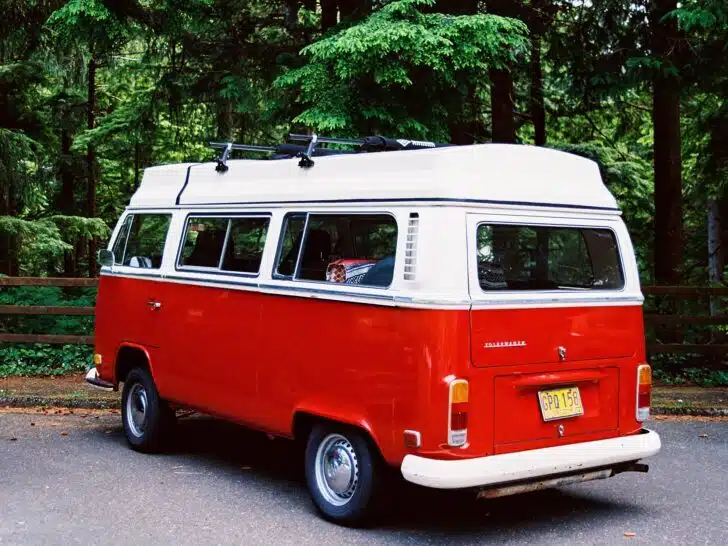Being avid boondockers and full-timers, a self-contained RV is an absolute necessity for us. But there’s a lot of confusion around exactly what being a “self-contained RV” really means.
So today we’re taking a look at the concept of self-contained RVs. What are they, how big are they, how are they different from other RVs (if at all), and do you need one?
- 1) What Does “Self-Contained” Mean on an RV?
- 2) What is the Smallest Self-Contained RV?
- 3) Can a Travel Trailer Be Self-Contained?
- 4) Are All RVs Self-Contained?
- 5) What Are the Advantages of Having a Self-Contained RV?
- 6) Are There Any Downsides to Having a Self-Contained RV?
- 7) How Can You Turn Any Van or Camper Into a Self-Contained RV?
What Does “Self-Contained” Mean on an RV?
“Self-contained” simply means that you have everything you need to live onboard your RV. This includes a bathroom/toilet and holding tanks, especially a fresh water supply (which could simply be portable storage containers) and wastewater holding tanks (both for “gray” water from sinks & the shower as well as “black” water from the toilet… which could be contained in a cassette or, in the case of composting toilets, a whole different type of “holding tank”).
Essentially, if you wouldn’t need to leave your RV for any reason such as using the bathroom, washing, making food, etc., your rig is self-contained. Depending on your RV lifestyle, this may also include access to power or even heat.
With a self-contained RV, the RVer can be completely reliant on the amenities provided by the RV, without any need for external resources.
What is the Smallest Self-Contained RV?
Technically, the smallest self-contained RVs are Class B RVs, but there are many self-built camper vans on the road that are of similar size that are also self-contained.
Most Class B RVs have a toilet and a shower, running water in the galley area, and three holding tanks – fresh water, gray water, and black water. In addition, Class B RVs have access to 12V power and also usually have a small refrigerator.
With a Class B RV, despite its diminutive size compared to larger RVs, you can be completely reliant on what you’re carrying on the RV.

Some Class B RVs have toilets, showers, and access to heat and electricity right on board, meaning that they’re self-contained. Class B RVs and others that don’t include the amenities to be self-sustaining are not considered self-contained.
Can a Travel Trailer Be Self-Contained?
A travel trailer can absolutely be self-contained – as long as it has the amenities noted above. If you can be completely self-reliant in your travel trailer (if you don’t need to leave the RV for the necessities of living, including using the bathroom), then you’ve got a self-contained travel trailer.
Most travel trailers are self-contained – but some aren’t – which brings us to the next question!
Are All RVs Self-Contained?
No. Not all recreational vehicles are self-contained. There are many RVs on the road that don’t have a toilet or a fresh water tank or a refrigerator. One example of this would be a teardrop trailer.
Teardrop trailers are tiny travel trailers that are fantastic for people who love to travel and just want a place to rest and sleep at night (that isn’t outdoors or on the ground). They can pull a teardrop trailer behind an SUV or even a car because they’re very lightweight. They may use campground restrooms or public restrooms, and they really just use the teardrop to relax and to sleep, and to carry what they need with them.
But RVs as small as teardrop trailers generally have no holding tanks, no toilet, and although they may have a source of power such as a little “solar generator” and even propane for cooking, they generally aren’t considered self-contained because they require outside amenities.

Our rented Class B+ RV in New Zealand had a cassette toilet rather than a large black water holding tank, but it was still self-contained because we had everything we needed onboard to be self-sufficient.
What Are the Advantages of Having a Self-Contained RV?
There are a number of advantages to having a self-contained RV, though they’re not for everyone.
We, for example, require a self-contained RV since our motorhome is our home, our office, and our recreational vehicle. We also love boondocking which means we need to be self-contained much of the time. We need to have everything in our RV that you’d need in a sticks & bricks house and office.
The advantages of having a self-contained RV is that you can camp anywhere. This would include out-of-the-way places in the desert, beside a lake, a parking lot in the midst of a long drive… or, really, just anywhere we can (legally) fit and park the RV.
Some commercial camping providers like Harvest Hosts, in fact, won’t allow campers who aren’t in a self-contained rig. This is likely because the overnighting areas provided through Harvest Hosts (farms, wineries, breweries, distilleries, museums, etc.) can’t provide restrooms, water, or power to campers, nor is the intention of Harvest Hosts to make campgrounds out of these locations. So, in order to become a member of Harvest Hosts, you need to have a self-contained RV.
There are other locations where you’d be required to be self-contained as well. Some RV parks and campgrounds don’t want the burden of guests who need to use the park’s facilities consistently, and there are also some boondocking locations where the agency managing the land may require it in order to avoid sanitary issues (unfortunately, everyone using a location can’t be relied upon to properly handle their waste… although that’s true of many self-contained RVers, too, unfortunately ????).
The main advantage to being self-contained is having everything you need on board so that no matter where you are, you’re able to care for your needs and the needs of those traveling with you without leaving the RV if necessary.
We’ve seen many news stories over the past couple of years exclaiming about the booming sales of RVs during the pandemic. Part of the reason for this is the self-contained nature of most RVs, which enables their owners to travel without needing public restrooms, restaurants, showers, etc… any of the places that would, normally, increase your chance of exposure.
Are There Any Downsides to Having a Self-Contained RV?
There are a few disadvantages as well. For one thing, they can be more expensive. If a self-contained RV is not affordable to a person who loves to travel or camp, but they have a car or an SUV and a teardrop camper or a little pop-up camper, they can still enjoy their love of travel and camping, and still have an enclosed structure in which to rest and sleep.
In fact, there are many people who are “car campers” and love to camp in their vehicles. There are folks who’ve turned minivans into little campers to enjoy with their whole families. The options are really limitless since this is a less expensive way to travel in terms of setup as well as fuel-consumption, and many people are exceptionally happy in a non-self-contained recreational vehicle.

Not all RVs are self-contained. Some smaller RVs that don’t have all the amenities for self-containment are nimble enough to park anywhere and have the advantage of far better fuel consumption.
Self-contained RVs are also larger as a rule (they need space for a bathroom, even if it’s an RV wet bath) and can be more difficult to take to certain locations.
So, while there are many advantages to having a self-contained RV, there are also a few advantages to having a non-self-contained travel rig.
How Can You Turn Any Van or Camper Into a Self-Contained RV?
Any van or camper can be made into a self-contained RV by adding a supply of fresh water, some type of toilet, a small refrigerator or ice cooler, and some source of power (and heat if necessary).
The addition of a “porta-potty” with a cassette “holding tank” or a simple hassock toilet that uses plastic bags and pine pellets can suffice as a toilet for the camper (it doesn’t have to be a flush toilet with a black water tank).
Water containers capable of carrying 5-10 gallons of fresh water on board are readily available, as are gallon jugs of water that can be easily stored in most vehicles.
And a small solar “generator” that’s recharged by the vehicle’s battery while driving or with a portable solar panel can provide just enough power for some campers.
One Important Note: adding water storage and a portable toilet (of any kind) doesn’t necessarily grant “self-contained” status to your vehicle. Many locations (from private RV parks to public lands) require that the vehicle you’re staying in is a “certified” self-contained RV. That certification comes from RVIA (for RVs) or NOAH (for tiny homes) and shows that your vehicle was manufactured to meet the specifications set out by the certifying bodies.
Our feeling is that self-contained or not self-contained, any way you can get out there and travel and explore the world around you and experience nature is a GREAT way to travel!
Geek Out with Us Every Week
Join our newsletter to learn about all things RV-related. Every week we offer free tips, tricks, product reviews, and more to our online community of RVers. So, whether this is your first time on the road or you’re a seasoned expert, we’d love for you to geek out with us!


Greg Knittel
Friday 5th of August 2022
Interested in off grid living in the future
Gay Travel Enthusiast
Monday 6th of December 2021
Hey guys. I hope y'all had a safe and fun Thanksgiving. I know I did. I ate too much. I agree with you. Most times, all I need is to be able to sleep when I'm away from home. So while a self-contained RV may be nice, I may not need a self-contained RV. If I had a partner to share in the experience, I may need one, one with a toilet, a shower, storage for our clothes, camping gear, etc. Particularly if we intend to travel long distances (farther than 35 miles).
I hope y'all have a safe Holiday Season.
Jason
TheRVgeeks
Thursday 9th of December 2021
Thanks, Jason... we did. Hope you had a nice Thanksgiving, too! And this is one of those situations that's best fit by one of Peter's Mom's favorite sayings: "That's why they make vanilla and chocolate!" There's something to suit everyone! ????
Stay safe... and Happy Holidays to you, too!